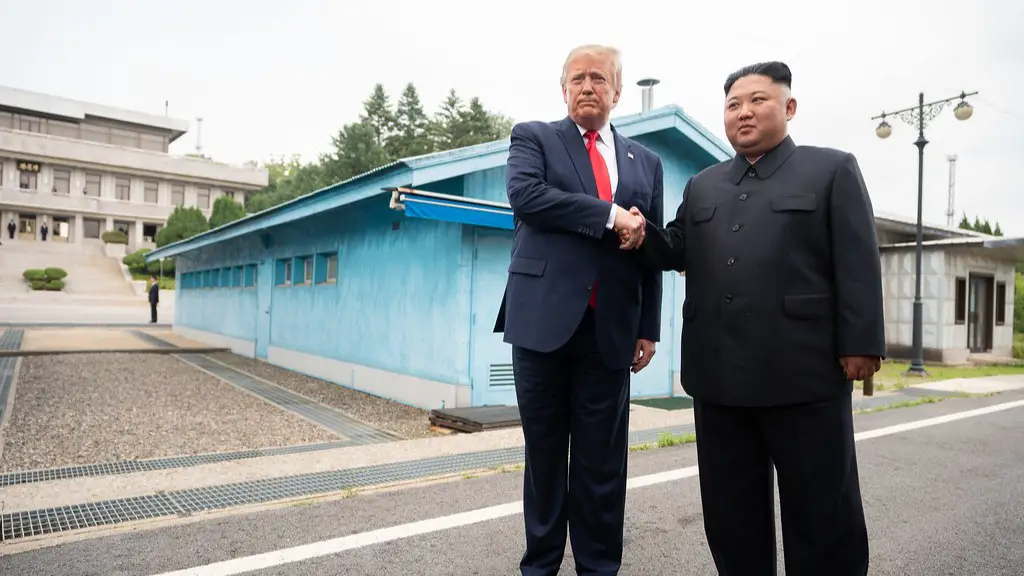History of North Korea and America
North Korea and America’s relationship has always been an interesting one. Both countries have had a long and complex history, with strong ties in both directions. The Korean War in the early 1950s began with an invasion of North Korea by South Korean forces backed by the United States, and this period was further marked by the Korean DMZ – a heavily fortified buffer zone separating North and South Korea. During the Cold War, North Korea also received significant military and economic aid from the Soviet Union and China, while the United States was heavily involved in the South.
The relationship has remained strained throughout the decades, with tensions between the two countries heightened by the presence of nuclear weapons in North Korea and the increasingly belligerent rhetoric from its leaders. North Korea has accused the United States of plotting to destroy the country, and has protested the US deployment of military forces in the region. On the other hand, the US has accused North Korea of human rights abuses and breaching international law.
North Korea’s Media Portrayal of America
North Korea’s official media portrays the United States as a hostile enemy constantly plotting to invade and occupy North Korea. This hostile narrative includes stories about nuclear weapons and US-backed groups in South Korea. North Korean propaganda portrays the United States as an imperialist power, attempting to lord over the Korean peninsula and impose its will on North Korea. It also paints the United States as a corrupt, evil force that is actively working to spread corruption and immorality throughout the region.
North Korean media also frequently takes a condemnatory stance against the United States’ democratic system. North Korean media accuses the United States of trampling on the rights of citizens and disregarding the rule of law. North Korea also claims that the United States practices ‘cultural imperialism’, attempting to impose Western values on other countries.
North Korea’s Perception of the US
North Korea’s perception of the United States has not softened over the decades. North Koreans still regard the United States as their greatest enemy and the United States’ military presence in South Korea still affects the way North Koreans view their own country and the United States.
In the minds of many North Koreans, the United States is a force of evil and a threat to their country’s independence. North Koreans live in a world where their media only offers one perspective on the United States, and this single viewpoint is rarely challenged by alternative opinions. Thus North Koreans view the United States as a single-minded, monolithic entity that is constantly plotting against them.
At the same time, there is a growing sense of wariness in North Korea of the United States’ growing presence in the region. North Koreans are aware that the US has many allies in the region, and particularly South Korea, and so they can’t help but be conscious of the potential threat posed by the US.
North Korea’s Leadership’s View of the US
It’s worth noting that North Korea’s current leader, Kim Jong-un, appears to have a less hostile view of the United States than his predecessors. North Korea’s previous leaders viewed the United States as a mortal enemy, while under Kim Jong-un, the country is making strides towards diplomacy. Kim Jong-un’s outreach to the United States has included denuclearization talks, a series of diplomatic visits to the United States, and the release of several US prisoners.
These developments have been interpreted as a sign that North Korea may finally be ready to reconcile with the United States and end decades of animosity between the two countries. However, Kim Jong-un’s outreach has been met with skepticism from the United States, with critics citing the country’s human rights abuses and its pursuit of nuclear weapons as major concerns.
How does North Korea’s leadership perceive US sanctions?
North Korea’s leaders have long viewed US sanctions as illegal and a violation of international law. The sanctions are seen as an attempt by the United States to use economic pressure to force North Korea to abandon its nuclear weapons program and agree to US demands, including the cessation of human rights abuses and the release of political prisoners.
The US sanctions have had a severe impact on North Korea’s economy. The sanctions have severely restricted North Korea’s access to foreign currency, hurting imports and exports and miring the country in poverty. At the same time, the sanctions have been seen as an attack on North Korea’s sovereignty, and North Korea’s leaders have responded defiantly, refusing to bow to US pressure or compromise on its nuclear weapons program.
North Korea’s view of US-South Korean military cooperation
US-South Korean military cooperation is viewed by North Korea’s leaders with great suspicion. North Koreans fear that US-South Korean drills are a prelude to a US invasion of North Korea, and view the military alliance as a threat to their country’s security. They also fear that US-South Korean military cooperation could embolden South Korea to attack North Korea, which would have devastating consequences for the entire region.
At the same time, many North Koreans view US-South Korean military cooperation as a double-edged sword. On the one hand, it strengthens South Korea’s defenses, which helps to deter North Korea from attacking, and on the other hand, it provides a deterrent force to any US aggression against North Korea.
The Future of North Korea and America’s Relationship
It is difficult to predict the future of North Korea’s relationship with the United States, as it depends on the policies of each individual leader. However, with North Korea continuing to make strides in diplomatic outreach and the United States’ willingness to develop a more cooperative relationship, there is hope that the two countries can find a path forward towards peace and reconciliation.
The future of North Korea’s relationship with the United States will ultimately be determined by the willingness of North Korea’s leadership to engage in meaningful dialogue and find common ground. If North Korea’s leaders are able to look past longstanding differences and build a new relationship based on mutual respect and trust, then there is a good chance that the two countries will be able to move forward in a more positive direction.
North Korea’s Perception of the US Economy
North Korea’s view of the US economy is one of admiration and envy. North Korea faces chronic economic difficulties, and its leaders have long viewed the US economy as a model for the country’s own economic development. North Korean leaders have praised the US economy for its stability, resilience, and dynamism, and have sought to emulate some of its practices in North Korea.
At the same time, North Korea has criticized the US economy as excessively capitalist and lacking in social welfare. North Korea’s leaders have pointed to the large wealth gap between rich and poor in the United States, as well as its high levels of inequality and poverty, as evidence of the flaws of the US economic system.
North Korea’s Perception of US Technology
North Korea has also adopted a keen interest in US technology, which its leaders see as an important asset for their own country. North Korea has sought to develop its own technology sector, and has sought to learn from and emulate US technology. North Korea’s leaders view the US as one of the world’s technological leaders, and the country’s strong ties to Silicon Valley have been seen as evidence of the potential to develop a successful tech sector in North Korea.
At the same time, North Korea has criticized the US for being overly reliant on technology, as it has been seen as contributing to a loss of quality of life and disconnection from the natural environment. North Korea’s leaders have argued that technological progress should be used to enhance quality of life, not detract from it.


